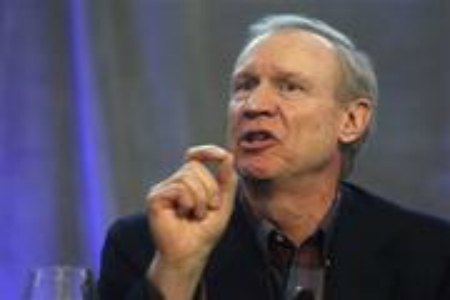
When superrich Republican Bruce Rauner decided to run for governor of Illinois, it was clear this wouldn’t be the kind of race the state was accustomed to. Rauner, who made his fortune as a venture capitalist, was new to campaigning and bragged of being beholden to no one. He came out swinging at entrenched special interests and “government union bosses” with an intensity not seen before.
Organized labor, which has long had cordial relations with state Republicans, went to full battle stations. Unions have pumped millions of dollars into a television advertising offensive to counter the new threat in advance of the March 18 primary. And Rauner has already committed more than $6 million from his own bank account to the battle.
The furious pace and extraordinary cost of a race weeks before the general election field is even set demonstrates what can happen when a wealthy businessman decides he wants to run a state, and of how unions can react when they feel especially threatened.
Both sides- having watched labor lose power under Republican governors in surrounding states – are fighting as though more than a single office is at stake.
“I think all the national unions fear they’ll have another Scott Walker on their hands if he should come in,” said Don Rose, a longtime Chicago political analyst, referring to the Republican governor of Wisconsin who stripped state employee unions of most of their bargaining powers after his election in 2010.
And Republicans, who have not controlled the Illinois governor’s mansion since 2003, see the race as the way to re-establish the party in a state that has been immune to the conservative drift elsewhere in the Midwest.
Rauner is considered the heavy favorite in the four-way GOP primary, as reflected in fundraising and recent polls. The outcome will determine who faces Gov. Pat Quinn, whom many Democrats see as vulnerable amid a state budget crisis and high unemployment.
Rauner, who made $53 million in 2012 but portrays himself as an everyman in a Carhartt jacket who loves hunting and fishing, is attempting to join the list of Republican business executives who have won office in recent years with no elective experience. They include former Indiana Gov. Mitch Daniels, a former Eli Lilly official; Wisconsin Sen. Ron Johnson, CEO of a plastics company, and Michigan Gov. Rick Snyder, former CEO of the Gateway computer company. They ran as problem-solvers in states with serious economic problems.
Rauner has cited Walker and Snyder-who also championed anti-union policies-as his role models.
Rauner’s ads, which have been an almost constant presence on Illinois television since last fall, have focused on Illinois’ struggling economy and on its $100 billion in public pension debt, which lawmakers voted only late last year to address. He says government union bosses “own” Quinn and the Democratic party and helped create the problems. One ad shows bleak images of Detroit and says Illinois could be the next place to declare bankruptcy.
The unions have fired back with ads alleging that Rauner’s business record shows he’s no reformer. One ad says a now-imprisoned figure in former Gov. Rod Blagojevich’s corruption case made $1 million working for one of Rauner’s companies. Another claims a company founded by Rauner’s private equity firm drained money from nursing homes, causing residents to suffer from dehydration and malnutrition while Rauner’s company profited. Rauner has denied both claims.
While unions have played a role in previous GOP primaries, the ferocity of their effort this time is “unprecedented,” said Pat Brady, a former chairman of the state party and veteran of local and national Republican campaigns.
“I’ve seen people do it, but I haven’t seen it to this level,” he said.
Greg Johnson, a supply supervisor at East Moline Correctional Center, said he and his fellow union members see Rauner as a threat.
“If Rauner were to take the governor’s mansion, we know one of the first things he’ll do on day one is try to take away our rights to collectively bargain,” said Johnson.
They’re mindful of the developments in Michigan and Indiana, where GOP governors made way for the passage of right to work legislation.
The Democratic Governors Association has pitched about $90,000 into the ad campaign, reflecting its concern about Illinois’ position, along with Minnesota, as the only Midwest states with Democratic governors. The move prompted the Republican Governors Association to accuse their opponents of trying to “hijack” the GOP primary.
The other Republican candidates – state Sen. Kirk Dillard, state Sen. Bill Brady and Treasurer Dan Rutherford – have been less combative toward organized labor during their combined 60 years in office, even accepting campaign donations from unions. The three have raised a fraction of Rauner’s $14 million fundraising total.
They have focused their attacks on Rauner as the front-runner, but the unions have dominated the offensive.
“They know Bruce is the only real threat to the failed status quo in Springfield and will say anything to try to stop him,” said Rauner campaign manager Chip Englander, who said Rauner is drawing bigger crowds at his events than ever before.
Having collected an additional $1 million in union donations just the past week, one of the anti-Rauner groups, organized as Illinois Freedom PAC, appears ready to sustain the attacks through election day in November if Rauner wins the primary.